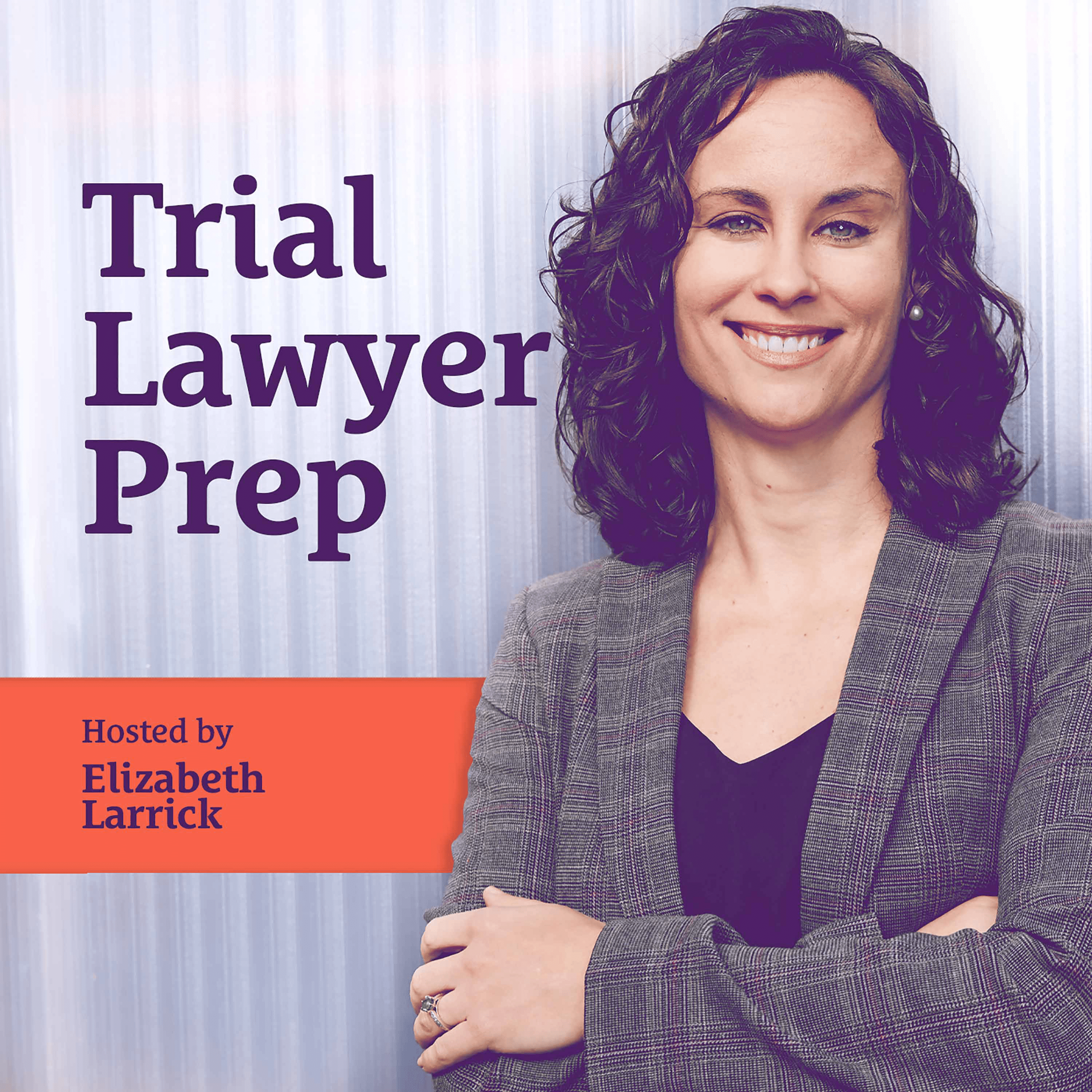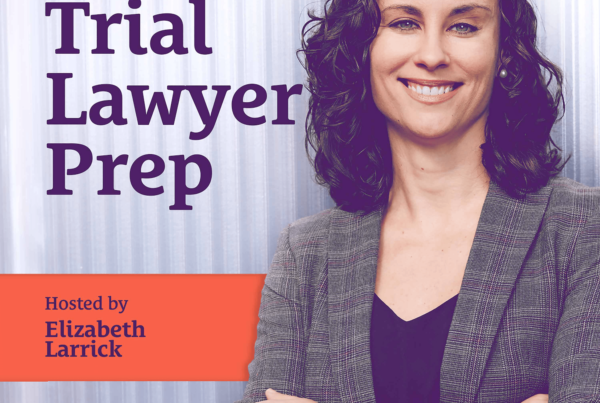In this episode, we are going to dive a little deeper into what this podcast is about and how it will serve you.
As a solo practitioner, it can be difficult to actively talk to your audience while getting legal work done. Part of a lawyer’s work is to write extensively (think emails, letters, motions, briefs, etc). By the time you’re writing a marketing piece such as a blog for your website or a marketing email, you’re pretty well spent. Plus, the tone is a little different.
I tried to hire folks to do copywriting but it never really sounded authentic to me or to the voice that I wanted. I started blogging which was great but, again, I was struggling with consistency. This went on until my friend, Ernie, suggested I start a podcast.
Being someone who loves listening to podcasts, I thought podcasting would be a great platform to deliver short, digestible information and practical ethical tips to help you with case preparation. At the end of the day, my goal is to help you get connected with your client and jury by polishing up your skills for the courtroom.
In this episode, you will hear:
- Podcasting vs. blogging
- What to expect from this podcast
- The kinds of topics we will cover
- Types of interviews and guests that will be in our future episodes
Subscribe and Review
Have you subscribed to our podcast? We’d love for you to subscribe if you haven’t yet.
We’d love it even more if you could drop a review or 5-star rating over on Apple Podcasts. Simply select “Ratings and Reviews” and “Write a Review” then a quick line with your favorite part of the episode. It only takes a second and it helps spread the word about the podcast.
Supporting Resources:
Episode Transcript:
Hello, Elizabeth Larrick here, and welcome everyone to this episode of Trial Lawyer Prep.
This is a podcast for trial lawyers with a focus on difficult cases, problematic clients, and taking those difficult and problematic cases to trial. This episode, we are going to dive a little deeper into what this [00:01:00] podcast is about and how it will serve you. I wanted to start a podcast for a few years, but I never seemed to get the idea very clear about what I wanted to talk about or really what I wanted to do.
And things came into a little bit clearer picture for me when I talked with another attorney, Ernie, the attorney who runs law firm autopilot podcast. Ernie and I had a great discussion about the difficulty as a solo practitioner to actively talk to our audience, but also get legal work done. As lawyers, we write extensively in our work.
Think emails, letters, motions, briefs. By the time it comes down to writing a marketing piece or a blog for your website or marketing email, you’re pretty well spent. Plus the tone and the audience is a little different. And again, as a solo, I tried to hire folks to do copywriting, but it never really sounded authentic to me or to the voice that [00:02:00] I wanted.
So I started blogging, which was great, but again, I was having a difficult time being consistent. Then here comes Ernie. Why not do a podcast? Aha. Yes. Thank you, Ernie. For me, learning is second nature. If I’m not learning something, I feel like I’m behind and I personally love the podcast format for me. As far as listening, I really enjoy reading and attending webinars and seminars, but time wise I can find it hard to squeeze all those in.
So I gravitated towards podcasts when I drive for my daily commute, short, digestible, just enough information to be dangerous, but unlike a blog, I never was a blog reader. I never really. Got into that, mostly books is what I read. So podcasting seemed like a really natural fit for me. So I want to say a big thank you to Ernie for this great idea.
So I got my idea, but really wanted to understand why, why start this [00:03:00] podcast? This idea of. Spreading really applicable how to ideas to other lawyers who are struggling with difficult cases. And it just came back to me as a solo, what do I do to find out information? How do I solve a problem in a case that, you know, at the time we kind of get sucked into this like.
It’s psychosis of thinking we’re the only ones with this super unique problem. But generally somebody out there probably had this problem before, but how do we find that answer? And most of the time seminars are great, but they focus on kind of bigger projects or bigger ideas. Sometimes they only focus on the law, not really application.
So here is this podcast to help with applicable. Practice tips for cases, there are tools that I use, most of these tools are because I had to figure out a way to do them myself so that I could save money and couldn’t necessarily hire somebody, but it was also working up difficult cases, cases that other folks necessarily didn’t [00:04:00] take.
But I took. And so I really want to have applicable, hands on, how to conversations with other trial lawyers. And so that’s what we’re going to try and do in this podcast. Specifically, we’re going to be looking at tools for testimony, case strategy, focus groups, analyzing jurors, trial tactics. But I always want to mix in conversations with other trial lawyers who’ve actually used these methods in cases and saw success.
We always want to keep our goal in mind to be connected with your client and connected with the jury, but polishing up our skills for the courtroom. So what can you expect? In this podcast, we’ll be doing some episodes on individual tools to improve case preparation, thinking about how to use focus groups, different focus groups, styles, when to run focus groups, looking at our client.
How can we help them prepare better? How can we get them ready for mediation for trial? [00:05:00] Also just. The long term when it comes to dealing with clients in cases that generally stretch longer than we ever anticipate, especially now in our post COVID era, things are very delayed. Also how to on case strategy, developing a plan early.
How to implement that plan along the way. We’ll also have episodes with interviews from trial lawyers who prepared tough cases and had tough trials and how they’re using things and what worked for them, what didn’t work for them. The focus is always going to be to be behind the scenes, to see the way the sausage is made.
And also of course, being open to any questions and topics that You, the listener want to hear. We’ll also have episodes containing interviews with professionals that assist trial lawyers. And there’s a lot of professionals out there that really help trial lawyers in a variety of ways. And we’re not really talking about expert witnesses.
We’re really going to be talking about folks who have developed businesses to help [00:06:00] trial lawyers perform their best in the courtroom. These could be professionals who specialize in visuals. To visually communicate to the jury or the judge, or sometimes even that insurance adjuster. Professionals who specialize in speech and voice.
Again, to hone those communication skills for any kind of case event you may have. Not just trial, but mediation, even vital motions, or hearings are super important with how we communicate. But again, all the goal of our episodes to provide practical, applicable tips for case preparation. At this point, a rising tide lifts all boats.
We’re in this to get better. A part of what I do on a daily basis is serve my legal community, either through volunteering with trial or association or a teaching with Kennan Trial Institute, and that’s just what we want to do with this podcast is pass these things along to you and also bring any episodes to you that you want to hear from.
I appreciate you listening. Thanks again. As always, this is a bright and shiny new [00:07:00] show. So if you could subscribe on your favorite podcast app, Apple, Google, Spotify, or wherever you listen, write a five star rating, maybe review, leave me a question, or as always, share it with your lawyer friends who you know, who may be struggling with something specific or with better ways to prepare.
Thanks again.





